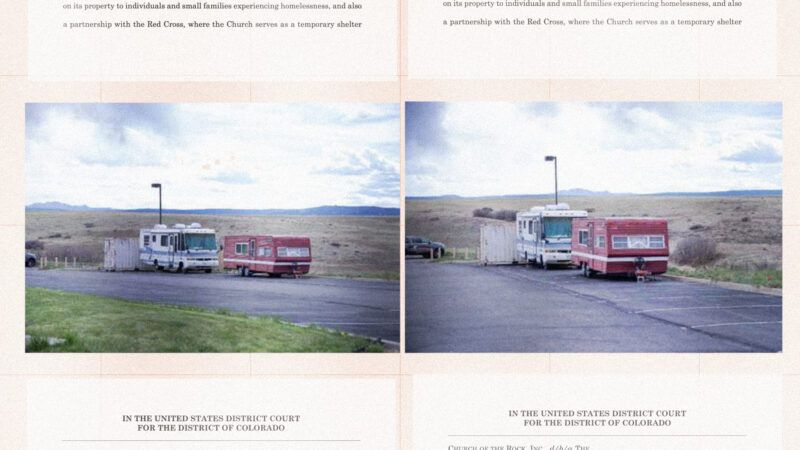This Colorado Church Wants To Shelter the Homeless. The Town Won't Let It.
The Church of the Rock is suing, arguing that the zoning crackdown in Castle Rock violates the First Amendment.

A federal judge last week ruled that a Colorado church can continue offering temporary shelter to homeless people after the town of Castle Rock leveraged its zoning code to put a stop to the charity program.
In May, the Church of the Rock filed a lawsuit against the town, asserting that the town's prohibition of the shelter program violates both the Religious Land Use and Institutionalized Persons Act (RLUIPA) and the Free Exercise Clause of the First Amendment.
The decision, handed down by Judge Daniel D. Domenico of the U.S. District Court for the District of Colorado, concluded that the church would "suffer irreparable harm" and that their claim against Castle Rock "has a strong likelihood of success." The ruling will allow them to continue offering shelter during the duration of the suit.
Since 2018, the Church of the Rock has provided "RVs and/or trailers parked on its property" for homeless people to stay in, according to the church's complaint. A spokesperson for First Liberty Institute, which is representing the church, estimated that the church aided "a couple dozen" people "at the most" throughout the course of the program, "given the limited space offered by the trailers."
The church's neighbors, like many local governments, contend that a homeless shelter near their residences presents a risk to their safety and that the town's zoning requirements should be respected. Earlier this year, a pastor in northwest Ohio was criminally charged for violating zoning regulations in the city of Bryan by sheltering people in his church. The Ohio church filed a similar lawsuit against the local government, also on First Amendment grounds.
"In Proverbs, it says your neighbors should dwell securely next to you, well, we don't feel secure now," one neighbor of the Church of the Rock, Tim DeVries, told CBS News last month. "What about my freedom? What about the respect for our zoning laws?"
"This is not what this neighborhood is about," DeVries continued. "I mean, who wants a homeless camp behind your community?"
A spokesperson for the First Liberty Institute tells Reason that the church "temporarily suspended its ministry in the Fall of 2023" after Castle Rock "began taking enforcement actions against the Church." In September 2022, the town sent the church a letter maintaining that parking RVs on church grounds "for either storage or use to live in" is not permitted "under the current zoning."
The church's attorneys contend that the homeless shelter has not harmed the community in any substantial way and that Castle Rock should allow the program to remain in place for the benefit of the town's homeless population. "It's obviously something that is harming no one," said attorney Jeremy Dys, senior counsel for the First Liberty Institute. "It's on the back of the property. It is helping everyone."
"I just don't quite understand why the city has been so bent on preventing this church from doing the right thing," Dys added. "They should be supporting the church rather than trying to stop their ministry."
Under the RLUPIA, governments cannot impose a "substantial burden" on religious exercise unless the burden furthers a compelling governmental interest and is the least restrictive means of furthering said interest. The church asserts that its homeless ministry is part of its religious obligation and that the town does not have a compelling interest in shutting it down.
To be successful, the church's Free Exercise claim will have to withstand the government's rejoinder under Employment Division v. Smith, the 1990 Supreme Court case which held that laws are not unconstitutional on Free Exercise grounds if they are "facially neutral and generally applied."
In its lawsuit, the church argues that Smith's general applicability requirement is not satisfied by the town's zoning restrictions and also contemplates Smith being "partially overrule[d]," potentially intending to bait the Supreme Court to eventually accept the case on appeal.
A spokesperson for Castle Rock tells Reason that "the Town has retained defense counsel to rigorously defend the zoning authority of communities." The Church of the Rock could not be reached for comment.


Show Comments (78)